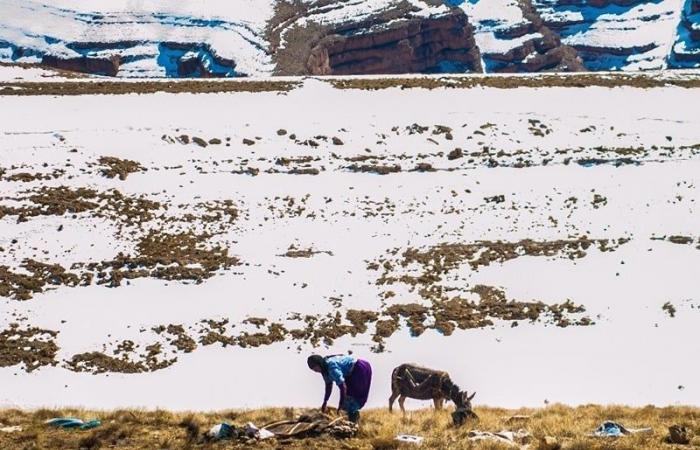Morocco, faced with the increasingly unpredictable hazards of climate change, is facing a crisis with profound implications. If the criticisms are flying – often issues from external media prone to sensationalism, particularly in the East of Eden – it is clear that the proactive intervention of the Moroccan Executive deserves a more balanced examination.
The management of natural disasters and the resilience of Moroccan institutions demonstrate a desire to preserve stability and meet the expectations of citizens, through the interventions of the Executive and all societal components of the Kingdom. Morocco has no lessons to learn from anyone in this area. He always knew how to overcome all kinds of ordeals, tragic or not, with a pragmatism inherent to democratic culture, reinforced by another characteristic, just as inherent to democracy, know-how.
Ssolidarity pretext for denigration : the rresponse to biased speech media
Dealing with winter cold spells in landlocked areas is a challenge shared by many nations, including Morocco and Algeria. However, the Algerian Press Agency (APS), the faded voice of the capos of Algiers, seems more concerned by the systematic denigration of the Kingdom than by an objective and constructive analysis. In light of articles from El Moudjahid and the APS and we ignore other service barkers, a response is necessary. It will serve to set the record straight and highlight the constant efforts made by the Moroccan authorities to alleviate the difficulties encountered by their citizens.
Contrary to the insinuations of the barker in the direction of the hair, the APS, Morocco does not remain idly faced with the harsh winters which strike its mountainous regions and more particularly those of Toubkal which have been stolen from the geography of Aurès in Algeria, may the two seniles next door please forgive us.
Every year therefore, and under the High Instructions of King Mohammed VI, the Royal Armed Forces (FAR), supported by the Royal Gendarmerie, the Auxiliary Forces, Civil Protection and teams from the ministries concerned, local authorities, carry out emergency operations. wingspan. Medical teams, snow removal engines and food and all the equipment that goes with it are mobilized to assist vulnerable populations, particularly in isolated areas.
The blatant contradictions of the Algerian discourse
Critics regarding the precariousness of these populations preferentially ignore the Kingdom’s multiple initiatives, such as the distribution of firewood at subsidized prices, medical caravans or the provision of temporary shelter for isolated families. If the situation can still be improved, it is misleading to present these regions as abandoned, when considerable resources are deployed each winter to overcome the logistical and climatic challenges.
In an exercise in self-congratulation, El Moudjahid extols the merits of the People’s National Army (ANP) in Algeria, intervening to clear roads and provide essential services to isolated populations. There is no denying the importance of these efforts. However, in the chapter of the dromedary which only sees the hump of that of others, it is curious to note that the same actions, when carried out in Morocco, are brushed aside by the official barker of the regime totalitarian Algiers which instead chooses to dwell on structural problems without recognizing the solutions proposed.
The argument of rising firewood prices, although relevant, is sensationalistically amplified, obscuring the overall context. The challenges linked to production and transport costs are universal and cannot be reduced to alleged Moroccan inaction. In fact, the Moroccan authorities have increased interventions to regulate prices and fight against speculation, while exploring sustainable energy alternatives.
A call for objectivity and cooperation
Rather than criticizing in a biased manner, the voice of its two masters could be inspired by Morocco’s pragmatic approaches and concrete business initiatives to support its citizens. Combating the effects of winter cold is an area in which regional cooperation could bear fruit. But for this to happen, the media discourse would still have to stop being complemented by idiotic and sterile quarrels.
Morocco, far from denigration campaigns, continues its commitment to its citizens. The intervention of the FAR and local authorities is not a simple communication exercise, but a sustained effort to meet the needs of vulnerable populations, despite economic and climatic constraints. Where some prefer to criticize from their air-conditioned editorial offices, the Kingdom chooses to act on the ground, with determination and solidarity.
In Morocco, we only have to remember the exceptional mobilization in the face of bad weather on a scale rarely observed in the South-East and Center-East of the Kingdom, the Moroccan authorities were quick to mobilize. The authorities concerned worked tirelessly to provide assistance to the affected populations. The cut roads have been cleared, temporary shelters put in place, and relief supplies have been deployed to isolated areas.
Thus, every winter, in a spirit of solidarity and resilience, they ensure the delivery of the necessary means to support the inhabitants of these remote areas, demonstrating their crucial role in the management of climatic and humanitarian crises. The criticisms expressed should in no way obscure the visible progress.






